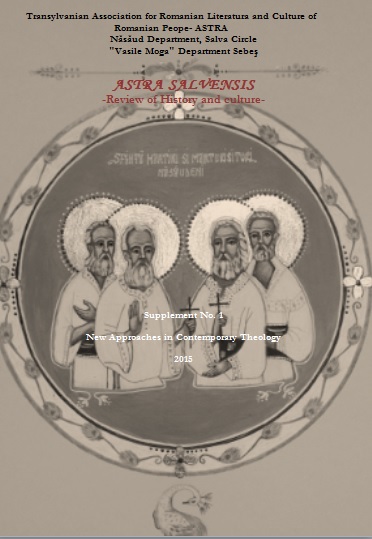
Die Ethik des Seins oder Was für ein Mensch sollte zum Objekt der Ethik, Philosophie und der Theologie werden?
This is a research about ethics and philosophy, that valorifies the ideas of Saint Thomas d'Aquino.
More...We kindly inform you that, as long as the subject affiliation of our 300.000+ articles is in progress, you might get unsufficient or no results on your third level or second level search. In this case, please broaden your search criteria.

This is a research about ethics and philosophy, that valorifies the ideas of Saint Thomas d'Aquino.
More...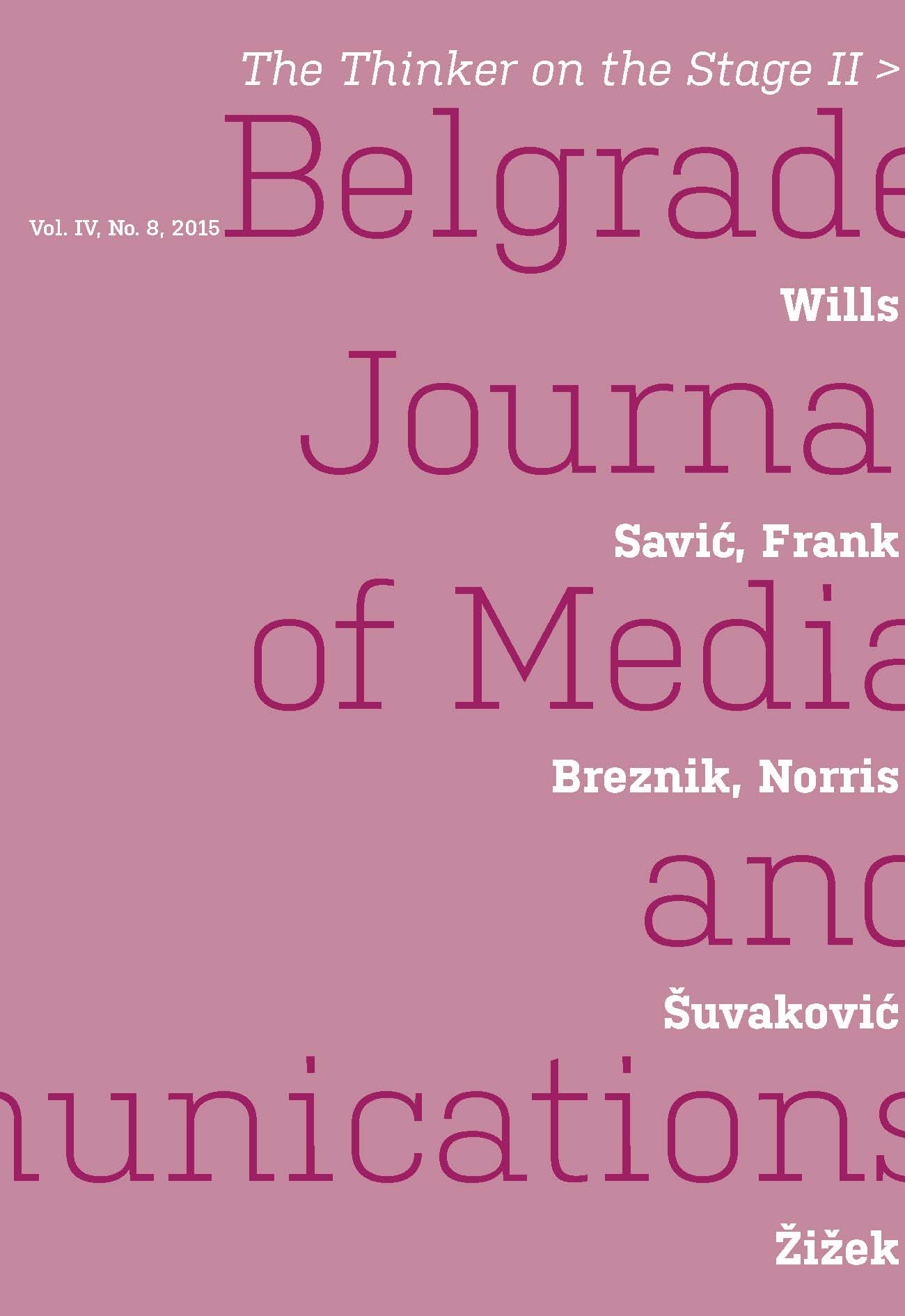
This essay contains additional comments on my previous book, The Monstrosity of Christ (2011). Here, I am following the main didactic line according to which anyone who wants to fight for emancipation should not be afraid to examine all aspects of religious life. The current story fits perfectly the materialist procedure of the immanent self-undermining of a religious edifice – the claim that god is evil or stupid can be much more unsettling than the claim that there is no god since the first claim destroys the very notion of divinity. Christ demands of each of his followers that they become necrophagic fetishists; Christians who justify their ludicrous anti-Semitism by characterizing Jewish people as ‘Christ-killers’ should keep this in mind: the Jews may have killed God, but the Christians ate him.
More...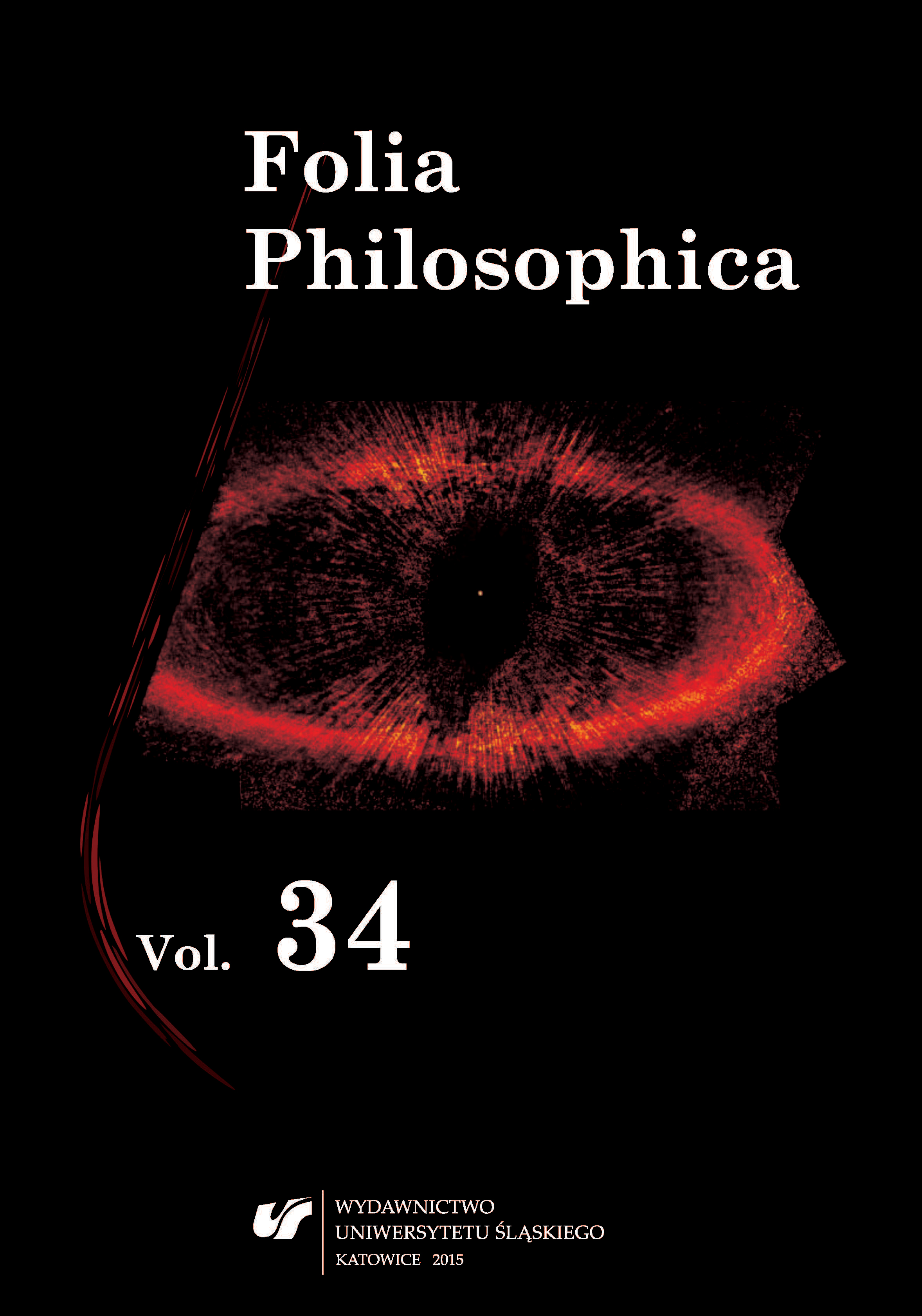
Leszek Kołakowski draws attention to the fact that rationalism as a philosophical method and definitive certainty as the aim are mutually irreconcilable. Each rationalist philosophy must leave a margin for uncertainty, lest it transforms into dull dogmatism. This observation of the Polish thinker becomes a source of inspiration for Hans Albert. In his work “Science and the Search for Truth”, he agrees with Kołakowski that goals of philosophical endeavours need redefining and puts forward his own metaphilosophical proposal, which specifies what philosophy can and should achieve in the framework of critical realism. The author examines and evaluates Albert’s proposal, referring to another view of the nature and role of philosophy as the assessment criterion—the one presented by José Ortega y Gasset in his study “En torno à Galileo” [“About Galileo”] and other writings.
More...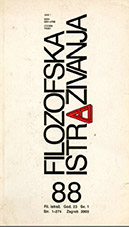
On the scent of historical and anthropological constants of religion and technology many are inclined to believe that technology, together with natural sciences, was absent, even persecuted, while over all dominated religion. Even thou this was, historically seen, partly the case, it shouldn't be excuse for any kind of attacking of some particular religious faith in contemporary world for ecological crisis and for danger of human starvation. While sometimes in the past the religion was trying to replace, in terms of authority, the role of technology and natural sciences, during last four centuries a lot of people thought that religion might or even should be replaced with technology and natural sciences. However, this article inherits two general understandings. First, humans are essentially cultural beings and religion is essential part of the culture. Every historical attempt to reduce religion to self-projection (Feuerbach), to opium for the people (Marx), to great illusion (Freud), and to death of God (Nietzsche), practically hasn't succeeded. On the contrary, the religion is today more vital than ever before regardless the exact meaning of that assertion, in terms of what kind of religious phenomena prevail in today' s world. This vitality does not depend exclusively on the duration of revealed religions, such as Christianity, and their institutions, but also depends on the destructiveness of the effects of modern technology allied with natural sciences. The humanity needs salvation and that salvation won't come from technology! Furthermore, humans are essentially laborious - technical - beings. There is no doubt that the formation of the culture dues exclusively to spiritual and material activities of man, as we can see it from the prehistoric primitive shaping to the modem Internet and interventions into molecular level. According to these two general understandings, the author seeks way how to prevent the continuation of an old hostilities between religion and the technology (natural sciences!). It is clear today that neither religion can replace technology and natural sciences nor these last can replace religion. But the question remains what technology really means? According to M. Heidegger, the question of technology remains open until it is understood in terms of its traditional, e.g. anthropological and instrumental meaning. What we need is to rethink the true meaning of technology from itself. The technology has its essence and this essence is not to be investigated from traditional point of view but from its very being the technology as such. Instead of this fact there is one solid point where religion can meet technology. This point is called ethics. Is it everything ethical what is technically achievable remains as a fundamental issue in dealing with technological matters. Furthermore, there is the need for methodological reflection upon philosophical and ethical meaning of modern technology. The religion is too general and undetermined notion. Because of it, the author considers the possibility of academic theology to enter in an interdisciplinary dialogue with modem technology.
More...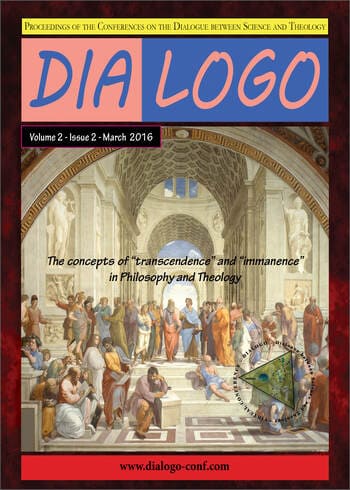
Human interests to Religion and Metaphysics are well explained by the desire of the people to answer to fundamental and eternal questions as “what is the sense of life” and “what is the purpose of life”. These questions have accompanied them from the beginning of conscious life. Many intellectuals, scientists and writers of former USSR and democratic Russia have brought essential contributions, opened new directions and finally have enriched with new concepts, ideas, ideologies and systems the worldwide Philosophy and Religion. A possible answer is the Creation allowing to Divinity to transcend in common life. Soul as Spiritual reflection of Divinity tends to perfection, reiterating in every generation the transcendence to God. At first sight there are no meeting points between Transcendence and Cosmism because the last notion has its beginning in the progress of Science. The evolution of modern Sciences, philosophical concepts and Religion gradually demonstrates correlated aspects which must be discovered in the future.
More...
In science, generally, the idea of research captures apriori the authority of the human being on the investigated reality. Researchers’ presumption of superiority in relation to what search is always clear and incontrovertible. Theological science and Theology researchers cannot benefit and cannot claim that presumption. If however they do, then we no longer talk about Theology, but about philosophical religion. In this study we will investigate the issue of God’s transcendence as objective argument of His existence. Given that we will not talk about chemical substances or about literary analysis, our research is enriched or impoverished not by the scientific competence that we have, but by the availability of God’s Being and our willingness to make of this study a scientific expression and a scientific experience of a dialogical meeting between us and God. When there are no common approaches to Theology and Philosophy, approaches based on our ability to intuit and determine the reality that surrounds us, we will evoke, as honest as possible, the reality of the scientific dialogue between us and God, a dialogue necessary in such a study. We hope that, based on the three chapters of this research, our thesis “Transcendence as Objective Argument of the Existence of the Personal God”, will convince both scientifically and in terms of the dialogue with God.
More...
On the occasion of the conference on Transcendence and Immanence - a topic building on the dialogue between philosophy and theology in the modern and post-modern time -, among the produced subjects, a discussion was held on the role played in respect with this dialogue by the inter-war famous philosophers, such as Lucian Blaga and Dumitru Stăniloaie. Below, we will present the issue of Transcendence according the philosopher-poet Lucian Blaga’s vision; his vision is structured into a Trilogy in his work: The Trilogy of Knowledge - The Dogmatic Aeon, The Luciferic Knowledge, The Transcendental Censorship - The Trilogy of the Culture - Horizon and Style; The Mioritic Space; The Genesis of the Metaphor and The Meaning of Culture - and The Trilogy of Values - Science and Creation; Magic Thinking and Religion; Art and Value. In these trilogies, the philosopher - poet elaborates, from an original metaphysical point of view, on the dimension of the knowledge of Transcendence - which he would define in in The Horizon of Mystery and Revelation. His vision will be addressed in a new theory of knowledge, which the philosopher-poet Lucian Blaga would distinguish as paradisiac knowledge and Lucifer knowledge, within a new Metaphysics that would allow access to Transcendence and to the wonders beyond. Postulating the existence of certain faculties of Conscience, his Metaphysics would become, according to the Theory of Transcendence, a must for the human spirit; a proof for his approach would be the great philosophical systems of the world, from the antique to the modern.
More...
The article deals with the theme of the Logos` immanence in the creation. The first part includes a scientific perspective while the second, a theological one. The first evidence that the universe has a beginning dates back to the 20s of last century. Most scientists believed until then that the universe was stationary and had always existed; there are references to the big bang, string theory, M theory. The second part encompasses a perspective on the theme of the rational nature of the world which constitutes a firm foundation for dialogue between Theology and science. The logoi have a particularizing or a unifing function, and the complete unity of the logoi is realized through and by the Logos, the Word of God. The essential difference between paradigms and logoi is that the latter belong to the temporal level and to the empirical world, while the former preexist synthetically into God.The uncreated divine energies are the logoi in the action of creating and supporting of the beings.
More...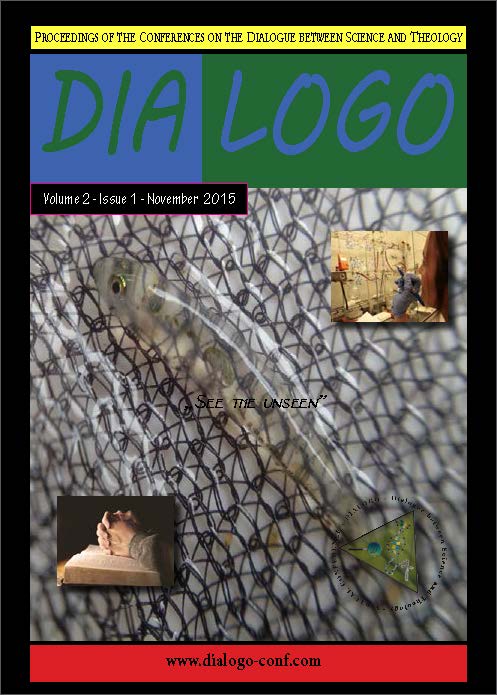
Elizabeth Cullinan’s short story “Life After Death” depicts a day in the life of a young New Yorker, Constance, walking along Lexington Avenue, attending the evening Mass at a Dominican church and visiting the Catholic college where she worked part time to pick up her paycheck. Though the woman is involved with the married Francis Hughes and confronted with the burden of the past and of intricate family dynamics, her voice, which is “the Cullinan narrative voice has become that of one of those skeptical granddaughters grown into a reasonably assured and independent adulthood [...] balanced between then and now, the ethnic and the worldly, and better able to judge self and others because of the doubleness” (Fanning qtd. in Bayor and Meagher 528). Thus, the paper will discuss the manner in which Elizabeth Cullinan maps, in her story, the oscillation of Irish Americans between the ethnic drive and a cosmopolitan individuality gained in New York, with a focus on the value of the duality of consciousness and spirituality, which facilitates enriching and clarifying answers to identity dilemmas.
More...
Scientists who approach questions related to faith and Godhood from their supposedly wholly objective angles routinely reach totally different conclusions. Therefore, a new approach using the most objective tool possible, that of pure mathematics, is attempted. The validity of using some mathematics in this context is briefly examined. Mathematical analysis leads to a number of counter-intuitive outcomes, such as the mathematical necessity of some measure of evil in a godlike universe, the mathematical illegitimacy of prescriptive religions, and more. This article is adapted from the forthcoming book ‘God and the Mathematics of Infinity: What Irreducible Mathematics Says About Godhood’.
More...
For among most contemporaries, the concept of Eros seems to have nothing to do with Christianity. Sifting through the psychoanalysis of sexual fantasy, theologically it says nothing. Our study gives reasons showing that for theologians since the dawn of the Christian era, Eros-love plays a fundamental role.. The connotations of this concept, however, are different from those of today, when its sensory meaning is more restricted to sexuality. Greek theologians of the first centuries after Christ, taught the concept of Plato enshrined as a unifying enthusiasm, the attraction of inferior to superior states, as “hungry and thirsty” for something continuously higher, developing, and enriching the connotation. The work of Dionysius ((Pseudo) Areopagite, the Idea of Good, leads us step by step up the ascent of the erotically chaste, and is identified with the One-God, who is the very source of love. Consequently, Eros-love originates from God, Eros- love being not only an ascending but firstly a descending love, which calls for a reciprocal communion.
More...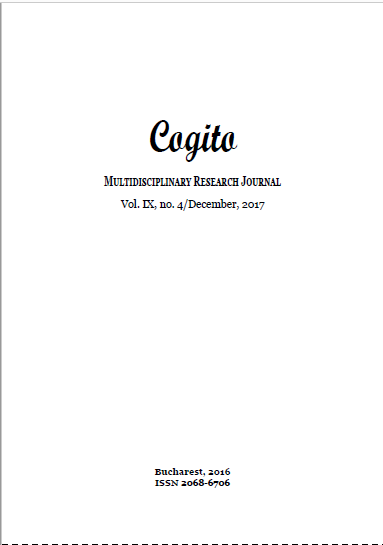
Leader of the generation of young writers and intellectuals in Romania during the interwar period, Mircea Eliade has become to be known worldwide as a theoretician and historian of the religious phenomenon. Brilliantly illustrating the history of religions through fundamental works, Eliade considered that the systematic study of religious ideas from pre-modern and extra-European societies made an important contribution to overcoming European-centered outlooks and building a more adequate image of the relation between specific and universal in culture. Through the progress made in the last century, when communication between cultures expanded, the history of religions facilitated the mutual knowledge of cultures and thus partook in the reconstruction of the ”global universe”, a process highlighting the contributions of all cultures to the heritage of humanity.
More...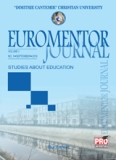
Contradictions have often arisen between philosophy and theology based on the way thinking relates to God. The two systems of thought present the creation of the world in general and of man in particular, one having the world of ideas as foundation, and the other the divine Revelation. The meeting of philosophical and theological thinking has always drawn the attention, as they both are dealing with the same topic, based on different foundations, so a question might be asked: where is the truth? Could it be known to man? Could man participate in happiness through the truth? Could the relativity of earthly truth and happiness be overcome? Is there a possibility of eternal happiness man can participate in? The answer to all these questions can be understood through the comparative study of the cosmosophy of philosophy together with the cosmology of theology.
More...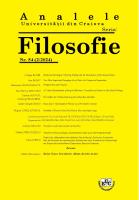
From Boethius's point of view, philosophy manages to console us in the face of death because it removes the veil of ignorance regarding human nature, offering us an authentic knowledge of our being, as persons in close connection with the divine, that is, with Good. This means that it reveals to us what good is in general and, implicitly, our good as humans, which presupposes the possession of spiritual goods, which we obtain exclusively through the exercise of virtue. From this perspective, no loss of our material goods, including our body, is not an evil for us. To the same extent, no injustice inflicted on us by others can affect us, as long as we preserve our virtue, that is, human dignity, and do not deviate from the line of good. According to his conception, the reward of a virtuous life is offered on the spot, and it consists precisely in the exercise of virtue. Therefore, man must be virtuous not because he expects to be rewarded in earthly life or after death, but because only in this way does he fully manifest his human nature, can he affirm himself as a man at the highest level, and this represents for him the greatest good and offers him true happiness.
More...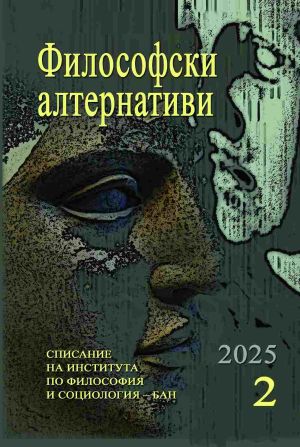
The article analyzes the tragic and tragic guilt from Plato and Aristotle to Kierkegaard.
More...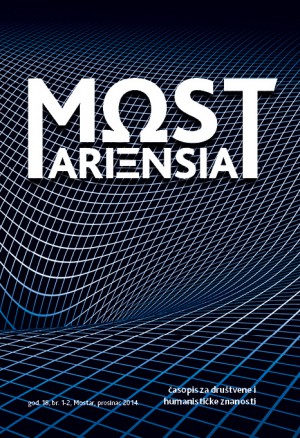
The paper deals with fundamentalism related to a scientist worldview and atheist fundamentalism as a corollary of a scientism. Although contradictory at first glance, the link between fundamentalism and scientism is revealed as something firm. The reason for this is the fact that scientism believes that science is the only and best answer to any question, a claim that is completely contrary to the nature of science itself. Similarly, atheist fundamentalists (Dawkins, Hitchens etc.) claim that any question related to God and religion can be resolved in the confines of science, which represents a clear misinterpretation of both science and religion. The link between scientism and fundamentalism is traced to the separation of science, understood as general inquiries about the world and all the beings in it, including ourselves, into hard and soft sciences or into natural sciences (or only science is some cultural backgrounds) and humanities. Contrary to this, the authors claim that it is impossible to come to a full understanding of the human being and the world around us without the joint effort of natural and human sciences.
More...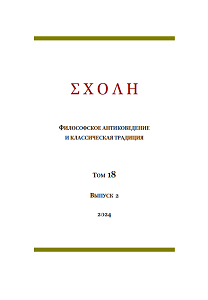
This paper offers a detailed analysis of Damascius' discourse on Orphic theology in Chapter 123 of On First Principles, focusing on how Damascius correlates the first principles of Rhapsodic and Hieronyman theogonies to his own Neoplatonic first principles. Through detailed textual analysis, it presents a schematic alignment of Damascian principles with Orphic theology.
More...
The deals with a quote from the Corpus Hermeticum (Hermet. XXIX) in one of the treatises (Qu. 68) by the Byzantine philosopher of the 11th century John Italos. On the one hand, this quotation is a scholia to the treatise – its author could be either John Italos himself, or his disciple or follower already in the 12th century – in the manuscript tradition “fused” with the main text. On the other hand, this scholia plays an important role, illustrating and developing the main idea of the treatise – at each level of being, the cause of this category of being is reproduced in a variety of what it is the cause of. Qu. 68 carries out this idea in relation to all levels of being, with the exception of the individual psychological level: it is this lacuna that is filled by a quote from the Corpus Hermeticum, where pagan gods act as metaphorical images for parts of a single human soul. A probable source of such teaching for John Italos and, possibly, for a later tradition is Michael Psellus, who in the treatise De omnifaria doctrina (O.D. 39-40), based on the commentary of pseudo-Simplicius “On the Soul” by Aristotle, speaks about the fundamental unity of all parts and properties of the soul.
More...
The article examines the process of the emergence of individual consciousness within the Greek tradition. First, the concept of “axial time” is clarified, when the need to relate everything to the Absolute, self-esteem and critical thinking came into culture. The reasons for this turn are discussed. The analysis of the Greek miracle begins with the formation of the polis, which replaced traditional institutions and redefined the place of man in society, where the conditions of personal freedom and the right to be a citizen gradually developed. An important factor was also that through the polis man realized his unity with the whole Greek world. The invention of alphabetic writing significantly added to the possibility of individual reflection on political life, but this is fully manifested only from the fourth century BC. The active role of colonization is analyzed, which required further reflection on the social structure. Such aspects of Greek life as equality, rationality and competition are considered. It is shown that the inseparable connection between the sacred and the secular in the life of the polis made religious life as public as possible and focused on the obligatory participation in a variety of rituals. It was in these activities that man manifested his piety, and so religion was not a private affair, but a public duty. Contestation, agon was also imbued with publicity rather than oriented towards individual dignity. A number of aspects of the manifestation of individual consciousness are considered: reflection over traditional ideas (philosophy), the emergence of personal authorship, the birth of lyric poetry, the emergence of the need to justify what was being said (proofs), and the emergence of humor as a reflection over tradition. The place of mystery cults in the spiritual life of the Greeks is investigated. Here, the key point that distinguishes participation in mysteries from other types of collective activity is the focus on a purely personal quest, irrelevant to the social position of the individual. Evidence is taken of such mysteries as the Eleusinian, Samothracian, Dionysian-Orphic, and Cybele. It is in the mysteries that the individual has a unique mystical experience and directly links his destiny with the divine. The history of all these cults goes far beyond the Archaic period, they intersect with each other in one way or another (which allows us to talk about bricolage) and, starting from about the 5th century BC, they all acquire a mystical character. It is the mystery experience that comes to the fore when we speak of the aspiration of consciousness toward the One, which, along with the liberation of the individual from direct association with social status, determined the strengthening of individual consciousness.
More...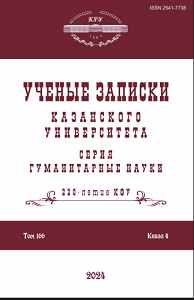
In this article, Kazan University philosophy, its characteristics and development trends, are analyzed from the perspective of the history of philosophy in Russia. The equivalence of the concepts “history of philosophy in Russia” and “history of Russian philosophy” is questioned and explored using the examples from the “stories” and “essays” written by prominent Russian philosophers such as A.I. Vvedensky, M.N. Ershov, B.V. Yakovenko, N.O. Lossky, and V.V. Zenkovsky. It is shown that they are likely to be equivalent and interchangeable, with the concept “history of Russian philosophy” approached in a broader sense. However, some important distinctions are still observed. When considered in a narrow sense, “Russian philosophy” appears to have certain fundamental, specific characteristics that define it as a specific type throughout its history and determine its unity. The results obtained reveal that some scholars view certain philosophical trends that developed in Russia as foreign or alien to the “spirit of Russian philosophy.” The peculiarities of Russian philosophy are singled out and summarized, and the validity of attempts to obstruct some of its manifestations is discussed. The critical role of university philosophy in the overall history of Russian philosophy is emphasized: it fostered philosophical interest and paved the way for purely philosophical work. Within this framework, Kazan University philosophy is examined.
More...